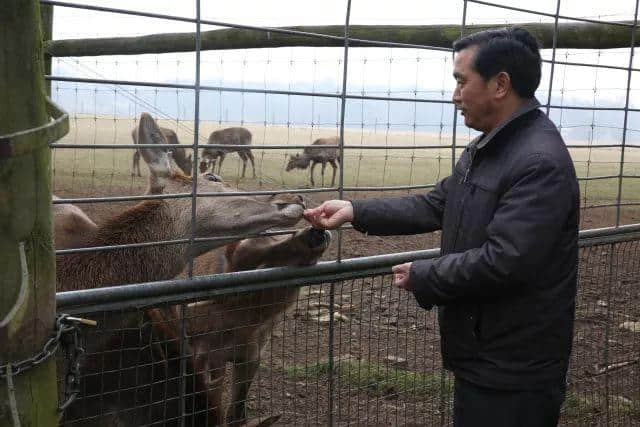编者按
长江是中华民族的母亲河,也是中华民族发展的重要支撑。推动长江经济带发展,必须从中华民族长远利益考虑,走生态优先、绿色发展之路,使绿水青山产生巨大生态效益、经济效益、社会效益,使母亲河永葆生机活力。

"荆有云梦,犀兕麋鹿满之。"(楚国有云梦泽,犀兕麋鹿到处都是)--出自《墨子》。
位于中国湖北省石首市的长江天鹅洲故道是云梦泽的一部分,自古以来是麋鹿栖息地,如今是中国麋鹿保护区。区内的千余头麋鹿,是中国乃至世界上野生程度最高的麋鹿种群。

200年前,除了北京南海子皇家猎苑中饲养的18头麋鹿外,麋鹿几乎在中国本土灭绝。八国联军攻打北京,猎苑毁于战乱,这里的最后一批麋鹿从此消亡。1900年前后,英国贝德福特公爵从欧洲一些动物园中收集到18头麋鹿,放养于自己的庄园。
上世纪90年代,麋鹿从英国引进回国,繁衍生息在天鹅洲内。"这是我们云梦泽畔的精灵。"李鹏飞说,用再多美好的词汇形容这群精灵都不过分。

李鹏飞等人救援受伤的麋鹿
年近花甲的李鹏飞守护麋鹿已有二十余年。之前,他是当地的一名中学教师,学校环境优越,工资待遇也不错。但他最终放弃教师工作,来到地处偏僻、交通不便、生活条件极为艰苦的保护区。
1995年,保护区麋鹿开始野生放养试。因没有野生放养经验可以借鉴,李鹏飞长年在野外跟踪麋鹿,细心了解它们的生活习性,掌握其活动规律。
1998年夏天,长江流域暴发特大洪水,地处长江故道的保护区变成水乡泽国,刚出生一星期的"娇娇"被逃难的母亲遗弃。负责保护工作的李鹏飞收养了它。

野生麋鹿见到李鹏飞,就会跑过来要东西吃。
李鹏飞每天给娇娇喂奶十多次,并模拟母鹿为小鹿舔肛的习性,亲自为娇娇擦洗肛门。从此,娇娇几乎与他形影不离。听到李鹏飞的脚步声,它就欢快地跑过来。
娇娇一周岁的时候,李鹏飞含着泪水目送它融入旷野鹿群。最初几个月里,当他前去探望时,娇娇还能走出鹿群,跑到他身边。现在,他已无法认出娇娇来:它与其他野鹿全无二致。
李鹏飞与娇娇的故事打动了很多人。武汉电视台以娇娇为主角,拍摄了一部儿童电视剧《回家》,并在意大利的一次国际比赛中获"最佳演员奖"和"世界和平奖"。
如今,麋鹿从引进时的94头发展到了1000余头,结束了世界上没有野生麋鹿种群的历史。这是我国物种重引进的成功典范。

Preface
The Yangtze River is known as the Mother River of the Chinese nation and is still a vital waterway to facilitate the country’s development. To promote the development of the Yangtze Economic Belt, we must take into account the long-term interests of the Chinese nation and follow the path of ecological priority and green development. There are truly huge ecological, economic, and social benefits yielded by green mountains and clear waters, and our mother river will remain dynamic and healthy if development is responsible.
The Deer Guardian of Yun-meng Lakes
"
There is a big lake in the State of Chu, where rhinoceros and deer can be seen everywhere." A saying from Mozi went like this. (Mozi, the book named after the great Chinese philosopher Mozi.)
Located in Shishou City, Hubei Province, China, the Swan Island of Yangtze River was a part of the ancient Yun-meng Lakes. It had been a deer habitat since ancient times and was now a reserve land for the Chinese milu deer. With more than a thousand deer, this reserve boasted the largest wild milu deer population in China-and even in the world.
200 years ago, milu deer were practically extinct in China, except for the 18 deer kept in the Nanhaizi Royal Hunting Park in Beijing. When the Eight-Power Allied Forces occupied Beijing, these 18 deer disappeared in the war. Around 1900, the British Duke of Bedford purchased 18 milu deer from some European zoos and kept them at his estate.
In the 1990s, the milu deer was introduced back to China from the United Kingdom and have resided and thrived on Swan Island ever since. "This is our elf on the side of Yun-meng Lakes." Li Pengfei said. Words are not enough to describe the beauty of these animals.
Now in his sixties, Li Pengfei has been working with milu deer for more than 20 years. He was once a local secondary school teacher, with a comfortable working environment and a decent salary. However, he eventually gave up his teaching job and worked in the reserve lands, which are geographically remote, with inconvenient commutes and harsh living conditions.
In 1995, an experiment was conducted concerning restocking the area with deer. Since there was no precedent, Li Pengfei had been tracking down the deer in the wild for many years in order to learn more about their living habits and regular activities.
In the summer of 1998, a disastrous flood broke out in the Yangtze River Valley, turning the reserve on the old watercourse of the river into a big swamp. "Jiaojiao," a one-week-old female baby deer, was washed away from its mother by a torrent. Li Pengfei, who was then responsible for animal protection, fortunately took her in.
After that, Li Pengfei began to feed this baby deer ten times a day, and bravely simulated a mother deer's hygienic behaviors by personally scrubbing Jiaojiao's anus. From then on, Jiaojiao was almost inseparable from him. Whenever she heard Li Pengfei's footsteps, she scampered over happily.
When Jiaojiao turned one year old, Li Pengfei released her into her wild deer herd with tears in his eyes. In the first few months, when he went to the place, Jiaojiao would still run to him. Nowadays she is no different from other wild deer-Li Pengfei could no longer distinguish her from the others.
The story of Li Pengfei and Jiaojiao impressed many people. Wuhan TV Station made a children's TV program named Going Home, with Jiaojiao as the leading hero. The TV program won a "Best Actor Award" and a "World Peace Prize" in an international film competition in Italy.
Today, the number of milu deer has increased from 94 when it was first brought back to China to more than 1,000. It has become a model for successful re-introduction of species in China.
(来源:特别关注)
热文推荐
友谊之桥|一个英国家庭与中国的六代情缘
通达全球|回溯万里茶道
科技扬帆|定汉神铁——汉阳铁厂的见证者